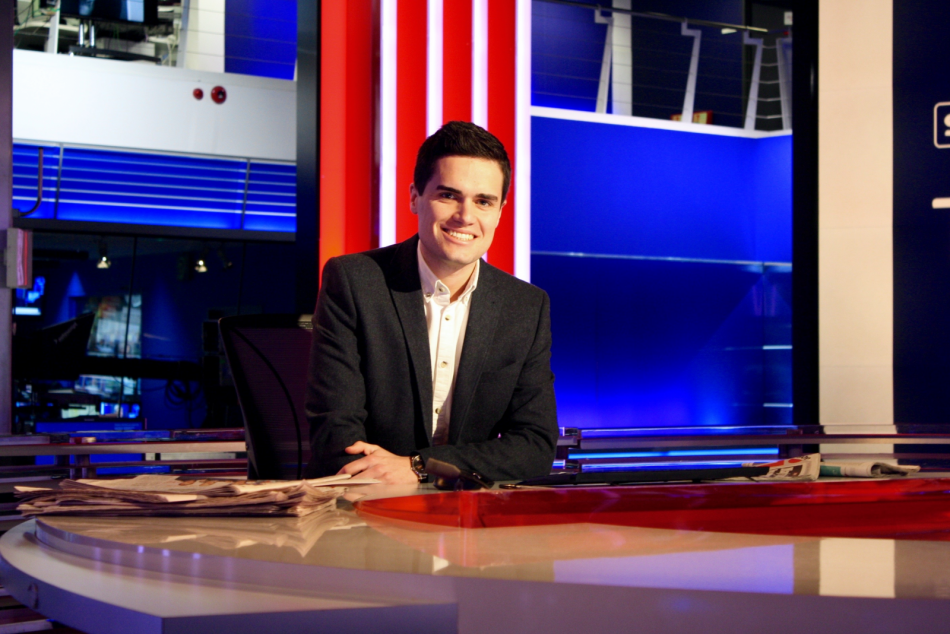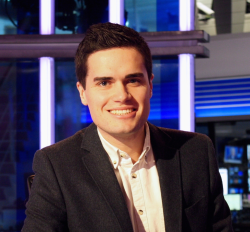Kit Bradshaw
Kit holds a Politics degree from Sussex and a Masters in Broadcast Journalism from City, University of London.

Kit’s story
He is currently working as a political correspondent at ITV News, having previously been a TV news producer and broadcast journalist for Sky News. His role involves producing content for TV and online, working with on-screen journalists on reports, editing videos, commissioning graphics, arranging interviews and writing scripts.
As well as having previously worked (voluntarily) as a BBC Breakfast Broadcast Journalist, he also worked in corporate communications for the British Transport Police and the NHS. He stayed on at Sussex for a year after graduating as the elected Communications Officer at the Students' Union and also worked for the local radio station Heart Surrey & Sussex while living in Brighton.
Kit was part of our Make it Happen: Careers in Media and Communications panel, and is a member of our Alumni Careers Network. He has recently been awarded an RTS (Royal Television Society) award for a documentary he co-produced and presented last year.
What was your very first job?
My first paid job was working in a local laundrette and ironing shop while I was still at school: I had the pleasant job of sorting through people’s dirty laundry every Saturday, but I did learn how to iron a shirt in under three minutes!
What first attracted you to studying at Sussex?
I didn't actually have my heart set on Sussex at first. I’d been to an open day and for whatever reason wasn’t sure about it. Leeds was actually my UCAS first choice but I got cold feet on results day and called Sussex and begged to be let in. Thank god they said yes- it was one of the best decisions I’ve ever made!
What was your first impression of the campus?
When I first arrived in Freshers' Week, I met some newly-made friends in Falmer Bar and already felt at home. The beautiful countryside wraps the campus in a tight cocoon - making you feel nicely protected from the outside world. It can feel like a little academic bubble at times - disconnected from reality - but I think that makes it the perfect environment for creativity and freedom of expression.
What part of your Sussex experience has helped you the most?
My Politics degree was fantastic and I really did love it, but I think it was my extra-curricular experience at Sussex that really helped me get where I am today. I occasionally wrote for The Badger, but my main passion was for URF- the student radio station.
My experience there allowed me to get fantastic journalism experience, meet industry leaders at the national Student Radio Conference and I even won a Student Radio Award for my interview with a Sussex member of staff who was accused of being involved in a violent student protest. Being involved in URF also allowed me to make some great friends who I’m still in touch with today.
You worked as an elected USSU Communications Officer in 2012- what was in your manifesto and how did this experience help you to get into journalism?
That seven-day student election campaign was still one of the best experiences of my life. I remember going door-to-door in East Slope in the snow handing out leaflets and cupcakes with ‘Kit 4 Komms’ in the design of the KitKat logo. I also remember that Sussex students take student politics very seriously. It’s because students care so much about Sussex and the Students’ Union that made serving as an elected student such an honour.
Some of my key manifesto pledges were reducing the amount of leaflets and posters the SU printed, getting more investment in student media and relaunching the SU Annual General Meeting. I got meet a whole new set of amazing people, campaign on some really important issues to improve things for students and massively improve my management, marketing and communications skills - which was very valuable when applying for PR and journalism jobs.
You have also worked with Sussex Partnership NHS Foundation Trust as a Communications Officer for the Children and Young People’s Division – any life lessons learnt from the focus groups you ran?
Working for a part of the NHS that focuses on mental health was an eye-opening experience. It’s a part of the health service that many of us don’t think about until we need it and it’s largely underfunded and very stretched. I think we need to all look out for one another and be more open about talking about our mental wellbeing, especially with children and young people. Talking can save lives.
Having worked in both means of communication, what is the main difference between working in TV and radio, and if you had to choose between the two what would you choose and why?
Radio journalism is a lot simpler. You can tell pretty much any story, with far fewer people. TV news is in another league. You’re constrained by the pictures. If you have no pictures, it’s far harder to tell the story. Similarly, you can’t just speak to someone on the phone, you need to get a camera to them. Having said that, modern technology has improved things massively and you regularly see video that people have filmed on their phones on the TV and interviews with people via Skype. I think I actually prefer radio. It’s a far more personal medium and you have a more intimate connection with the listener. But don’t tell my current TV bosses that!
In your role as Press Officer for the British Transport Police, what did you most enjoy and what was the biggest challenge?
In many ways it was my dream job. It combined my boyhood obsession with the police with my desire to go into journalism and communications. I really enjoyed working with detectives on media appeals for serious crimes- many of them sexual offences. You got a great deal of job satisfaction when a media appeal you’d worked on led to a suspect being arrested. One of the toughest parts of the job was attending major incidents. It made me appreciate the incredibly hard work done by our emergency service workers every day.
What would the soundtrack of your university days sound like?
Listening to URF- obviously!
What did you want to be when you were growing up?
A policeman or train driver.
Which film has changed your life?
Bloody Sunday (2002)- it totally changed the way I looked at the world.
What are your success habits?
I get up early and go to bed early.
What do you do to unwind?
I swim or go for a walk with the dogs.
Who inspires you most and why?
Some of my friends from school and university who are now doing the most incredible things with their lives.
What do you consider to be your biggest achievement?
I was very proud to be recently nominated for an RTS (Royal Television Society) award for a documentary I presented last year. The awards ceremony is later this month.
Who would you invite to your dream dinner party and why?
My inner politics geek would want Clement Attlee, Margaret Thatcher and Tony Blair round the table - assuming I can bring people back from the dead? If not, John Humphrys, Alan Rusbridger and Nick Robinson would be interesting guests. Although I doubt I’d get a word in edgeways!
Life’s biggest lesson so far?
Be nice to people. You’ll probably work with them one day.
What's your favourite quote or life motto?
“Keep on pushing” - which were the last words of wisdom from an old family friend, and former Fleet Street editor, the last time I saw him before he passed away.

Politics 2012